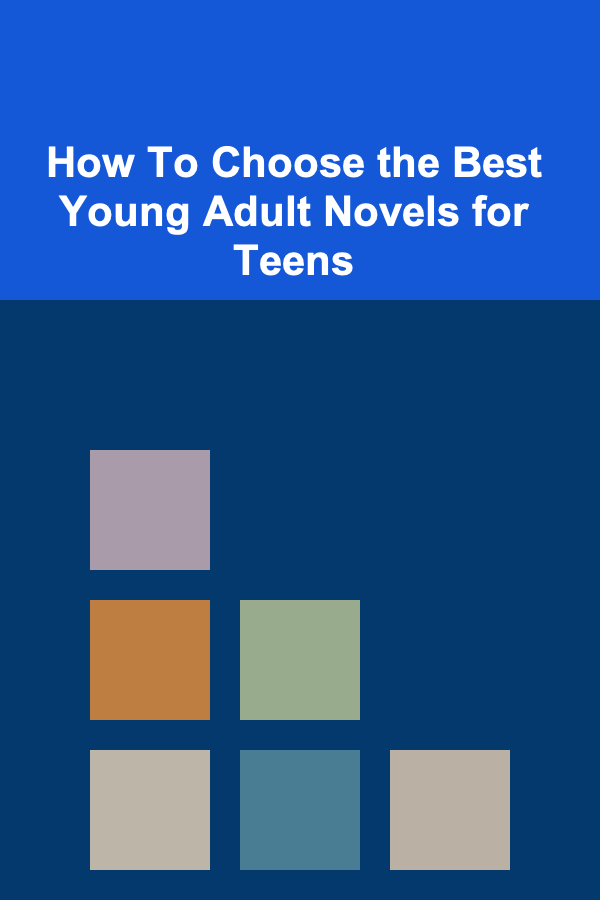
How To Choose the Best Young Adult Novels for Teens
ebook include PDF & Audio bundle (Micro Guide)
$12.99$9.99
Limited Time Offer! Order within the next:

Navigating the world of Young Adult (YA) literature can feel like traversing a vast and ever-expanding ocean. The sheer volume of titles available, coupled with the diverse range of themes, genres, and writing styles, makes it a challenging task to identify the "best" novels for a particular teenager. The key lies in understanding the nuances of the genre, considering the individual reader's preferences and developmental stage, and recognizing the potential impact that these stories can have on young minds. This comprehensive guide aims to provide parents, educators, librarians, and even teens themselves with the tools and insights necessary to select YA novels that are not only engaging and entertaining but also enriching and empowering.
Understanding the Young Adult Genre
Before diving into specific titles, it's crucial to grasp what defines the YA genre. While often associated with a specific age range (typically 13-19), YA is more accurately defined by its themes, perspectives, and intended audience. YA novels generally feature protagonists who are navigating the complexities of adolescence, grappling with identity formation, exploring relationships, and confronting challenges that resonate with the teenage experience. While romantic relationships are common, the genre encompasses much more. These books frequently tackle serious issues such as mental health, social injustice, grief, and finding one's place in the world.
Importantly, the YA genre is not monolithic. It encompasses a wide array of subgenres, including:
- Contemporary: Realistic fiction that explores everyday life and challenges faced by contemporary teenagers. These novels often deal with issues like peer pressure, family dynamics, mental health, and identity.
- Fantasy: Novels that feature magical elements, mythical creatures, and fantastical worlds. These can range from high fantasy with complex world-building to urban fantasy set in a more familiar, modern setting.
- Science Fiction: Stories set in the future or in alternative realities, often exploring technological advancements, social issues, and the consequences of scientific progress.
- Dystopian: Novels that depict oppressive societies or futuristic worlds gone wrong, often serving as cautionary tales about social and political issues.
- Historical Fiction: Stories set in the past, often exploring historical events or periods through the lens of a young protagonist.
- Thriller/Mystery: Suspenseful stories that involve solving a crime or unraveling a mystery, often with high stakes and unexpected twists.
- Romance: Novels that focus on romantic relationships and the development of love, from lighthearted and fluffy to more intense and dramatic.
Recognizing these subgenres is essential for narrowing down choices and catering to specific reading interests.
Factors to Consider When Choosing YA Novels
Selecting the right YA novel involves a multifaceted approach that considers the reader's individual characteristics, the book's content, and its potential impact.
1. Reader's Age and Maturity Level
While YA is generally targeted at teenagers, the maturity level of individual readers can vary significantly. It's important to consider the reader's emotional and cognitive development when choosing a book. A 13-year-old might not be ready for a novel that deals with graphic violence or mature themes, while a 17-year-old might find such a book engaging and thought-provoking.
Pay attention to the book's content warnings and reviews from trusted sources. These can provide valuable insights into the book's suitability for a particular reader. Don't shy away from discussing the book's themes with the reader beforehand to gauge their comfort level.
2. Reading Interests and Preferences
This seems obvious, but it is vital! A reader is more likely to engage with a book that aligns with their existing interests. Do they enjoy fantasy, science fiction, romance, or realistic fiction? What are their favorite movies, TV shows, or video games? Identifying these preferences can help narrow down the search and increase the likelihood of a positive reading experience.
Encourage exploration beyond familiar genres. While catering to existing interests is important, also consider introducing readers to new genres or authors that they might not have discovered otherwise. Libraries and bookstores often have displays that showcase diverse and engaging YA novels.
3. Themes and Content
YA novels often tackle complex and challenging themes, such as identity, sexuality, mental health, social justice, and grief. It's crucial to be aware of these themes and consider their potential impact on the reader. Are the themes presented in a sensitive and responsible manner? Does the book offer positive and empowering messages? Or does it perpetuate harmful stereotypes or promote unhealthy behaviors?
Reading reviews from trusted sources, such as professional book reviewers, librarians, and educators, can provide valuable insights into the book's themes and content. Be wary of reviews that are overly sensational or biased. Look for reviews that offer a balanced and thoughtful assessment of the book's strengths and weaknesses.
4. Writing Style and Complexity
The writing style of a YA novel can significantly impact its readability and appeal. Some readers prefer straightforward and accessible prose, while others appreciate more complex and lyrical writing. Consider the reader's reading comprehension skills and their tolerance for stylistic experimentation.
Read excerpts or sample chapters before committing to a full novel. This can provide a sense of the author's writing style and determine whether it aligns with the reader's preferences. Pay attention to the pacing, the dialogue, and the overall tone of the book.
5. Representation and Diversity
It's important to choose YA novels that represent a diverse range of experiences and perspectives. This includes books featuring characters from different racial, ethnic, cultural, and socioeconomic backgrounds, as well as characters with disabilities, LGBTQ+ characters, and characters with diverse religious beliefs.
Reading diverse books can broaden readers' understanding of the world, foster empathy and compassion, and challenge stereotypes and prejudices. Look for books that are written by authors who share the same identity as the characters they are portraying. This can ensure that the characters are portrayed authentically and respectfully.
6. Book Length and Format
Consider the book's length and format when making a selection. A longer novel might be intimidating for a reluctant reader, while a shorter novel might not provide enough depth and complexity for a more advanced reader. Audiobooks can be a great option for readers who struggle with traditional print formats.
Graphic novels and comics can also be a great entry point into reading for reluctant readers. They offer a visually engaging and accessible format that can make reading more enjoyable and less daunting.
7. Awards and Recognition
Awards and recognition can be a helpful indicator of a book's quality and impact. The Printz Award, the National Book Award for Young People's Literature, and the Coretta Scott King Award are just a few of the prestigious awards that recognize outstanding YA novels.
However, it's important to remember that awards are not the only measure of a book's worth. A book that wins an award might not be the right fit for every reader. Consider the other factors mentioned above when making your selection.
Resources for Finding the Best YA Novels
Numerous resources are available to help you navigate the vast world of YA literature and identify the best books for teens:
- Libraries: Librarians are invaluable resources for finding age-appropriate and engaging YA novels. They can provide recommendations based on the reader's interests and reading level, and they often curate lists of recommended books.
- Bookstores: Independent bookstores often have knowledgeable staff who can offer personalized recommendations. They also tend to stock a more diverse range of titles than large chain bookstores.
- Online Book Review Websites: Websites like Goodreads, Booklist, and Kirkus Reviews provide comprehensive reviews of YA novels. These reviews can offer valuable insights into the book's themes, content, and writing style.
- Young Adult Literature Blogs: Many blogs are dedicated to reviewing and discussing YA literature. These blogs can provide a more informal and personal perspective on the books.
- Parent and Educator Websites: Websites like Common Sense Media offer age-based ratings and reviews of books, movies, and other media. These websites can be helpful for parents who are concerned about the content of YA novels.
- Talking to Teens: The most important resource is often the teen themselves. Discuss what kinds of books they've enjoyed in the past, what themes interest them, and what they're looking for in their next read.
The Power of Reading YA Literature
Choosing the right YA novels for teens is not just about finding entertaining reads; it's about fostering a love of reading, promoting critical thinking, and empowering young people to navigate the complexities of the world around them. YA literature can offer a window into different perspectives, challenge assumptions, and encourage empathy and understanding.
Specifically, the right YA novel can:
- Promote Empathy and Understanding: By reading about characters from diverse backgrounds and experiences, teens can develop a greater understanding of the world and a greater appreciation for the perspectives of others.
- Foster Critical Thinking Skills: YA novels often tackle complex and challenging themes, such as social justice, identity, and mental health. Reading these books can encourage teens to think critically about these issues and form their own opinions.
- Provide a Safe Space for Exploration: YA novels can provide a safe space for teens to explore difficult or sensitive topics, such as sexuality, grief, and trauma. Reading about characters who are grappling with similar issues can help teens feel less alone and more understood.
- Build Confidence and Self-Esteem: Reading about characters who overcome challenges and achieve their goals can inspire teens to believe in themselves and their own potential.
- Improve Reading Comprehension and Vocabulary: Reading regularly can improve reading comprehension skills and expand vocabulary.
- Spark Meaningful Conversations: YA novels can be a great starting point for conversations about important issues with teens. Discussing characters' choices and the themes of the book can help teens develop their own values and beliefs.
Addressing Common Concerns about YA Literature
Some parents and educators express concerns about the content of YA literature, particularly regarding themes such as sexuality, violence, and drug use. It's important to acknowledge these concerns and address them in a thoughtful and informed manner.
Here are some strategies for addressing common concerns:
- Read the Books Yourself: Before recommending a book to a teen, read it yourself to get a sense of its content and themes. This will allow you to assess its suitability for the reader and address any potential concerns proactively.
- Have Open and Honest Conversations: Talk to teens about the issues that are raised in the books they are reading. This can provide an opportunity to clarify misunderstandings, address concerns, and foster critical thinking.
- Establish Clear Boundaries: Set clear boundaries regarding what is acceptable reading material. This can help teens make responsible choices and avoid books that are not appropriate for their age or maturity level.
- Focus on the Positive Messages: Emphasize the positive messages that are conveyed in YA literature, such as the importance of empathy, resilience, and social justice.
- Remember the Power of Choice: Ultimately, the decision of what to read should be left to the individual reader (with guidance and support from parents and educators). Trust teens to make responsible choices and encourage them to explore a wide range of genres and authors.
Conclusion
Choosing the best YA novels for teens is a complex and nuanced process that requires careful consideration of the reader's individual characteristics, the book's content, and its potential impact. By understanding the nuances of the genre, considering the reader's preferences and developmental stage, and utilizing available resources, parents, educators, and librarians can help teens discover books that are not only entertaining but also enriching and empowering. Ultimately, the goal is to foster a lifelong love of reading and to equip young people with the knowledge, skills, and perspectives they need to navigate the complexities of the world around them. The world of YA offers a rich tapestry of stories just waiting to be discovered; with careful consideration and open communication, the right books can make a profound difference in a young person's life.
Reading More From Our Other Websites
- [Personal Financial Planning 101] How to Crush Your Student Loan Debt: A Step-by-Step Guide
- [Organization Tip 101] How to Use Storage Ottomans for Dual Functionality
- [Star Gazing Tip 101] From Origins to Observations: How Meteor Showers Shape Our Night Sky
- [Organization Tip 101] How to Create a Household Chore Chart for Family Members
- [Ziplining Tip 101] Post-Processing Magic: Enhancing Motion and Drama in Your Zipline Images
- [Home Party Planning 101] How to Plan a Cozy and Chic Winter Party at Home
- [Personal Financial Planning 101] How to Manage Personal Finances: A Beginner's Guide to Financial Success
- [Simple Life Tip 101] Best Mindful Decluttering Strategies for Small Apartment Spaces
- [Home Rental Property 101] How to Promote "Apartments with a Gym" to Attract Fitness-Conscious Renters
- [Home Rental Property 101] How to Troubleshoot Common Issues with Rentals with a Smart Home System

How to Become a Confident Coder
Read More
How to Create a Safe Work Environment for DIY Projects
Read More
How to Organize Your Email Inbox for Efficiency
Read More
How to Transform Your Guest Room into a Holiday Haven
Read More
How to Create Printable Bookmarks for Book Clubs
Read More
10 Tips for Creating Ceramic Jewelry with Resin
Read MoreOther Products

How to Become a Confident Coder
Read More
How to Create a Safe Work Environment for DIY Projects
Read More
How to Organize Your Email Inbox for Efficiency
Read More
How to Transform Your Guest Room into a Holiday Haven
Read More
How to Create Printable Bookmarks for Book Clubs
Read More